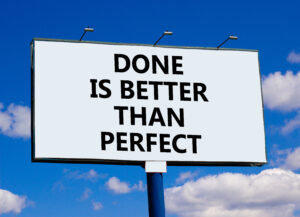Blog

This Is How to Overcome Perfectionism: 14 Approaches
Do you struggle with perfectionism? It’s a big problem today for many, including ambitious professionals and leaders. It’s also widely misunderstood, and even misappropriated as a badge of honor. Perfectionism is a personal standard that demands or expects flawlessness. It typically includes overly critical self-evaluations and excessive concerns about harsh judgments from others. Perfectionism entails striving for unrealistic or even unattainable goals. What follows, of course, is disappointment when you fail to achieve them. If you’re a perfectionist, you translate low performance into low self-worth. The assumption behind it is that perfection is the only route to self-acceptance. Some people

This Is How to Develop Self-Awareness: 7 Approaches
Are you self-aware? It’s common for people to overestimate their self-awareness. Being self-aware means having a clear and accurate understanding of yourself, including your feelings, motives, desires, core values, strengths, and weaknesses. Do you have a realistic view of yourself, including a good and true sense of how others perceive you?* Based on multiple investigations with nearly 5,000 participants, organizational psychologist Dr. Tasha Eurich and her colleagues found the following: “…even though most people believe they are self-aware, self-awareness is a truly rare quality: We estimate that only 10-15% of the people we studied actually fit the criteria.” -Dr. Tasha

This Is How to Avoid Complacency
Have you become complacent? Have you been lulled into a state of easy contentment? Or are you at risk of not paying enough attention to potential problems? Is complacency preventing you from trying harder and making needed improvements? It’s a common trap. Perhaps you’ve been complacent about your health—or the health of those you love? Have you been complacent about your work, team, leadership, or organization? Or complacent about your relationships? About democracy or the planet? You may be struggling with complacency if you’re taking things for granted or if you have too much routine. Do things feel monotonous? Are

Why You Should Build Your Passions into Your Life and Work
What are the things that consume you with palpable emotion over time? What are the things you love so much that you’re willing to suffer for them? Those are your passions. You probably have passions in different domains of your life. Are you passionate about your work—or at least parts of it? Do you talk often about what you like about your work, or find yourself working extra hours even when you don’t have to? Are you building your passions into your days and weeks? 14 Benefits of Building Your Passions into Your Life and Work There are many

This Is How to Develop Focus: 20 Approaches
It feels like the world is dead-set against our focus these days. Are you bombarded with digital distractions? Are there near-constant requests for your attention? Do you feel overloaded? Does your concentration feel fragmented? Find yourself checking your phone constantly? These aren’t just annoyances. They can become a disaster for your productivity and quality of life. Focus and Leadership According to a survey of more than 35,000 leaders in more than 100 countries, 73% reported feeling distracted from their current task some or most of the time, and 67% described their minds as cluttered. Nearly all the leaders surveyed (a

How to Break Bad Habits and Create Good Ones
Got bad habits? You probably do. And you’re not alone. Are you in the habit of avoiding hard or uncomfortable things, or people? Dispensing advice without being asked? Not getting enough fresh air and sunshine? Not exercising and moving enough? Sitting too much? Procrastinating? Being late or doing things at the last minute? Blaming others instead of taking responsibility and finding solutions? Complaining? Doubting yourself? Compulsively using your smartphone? Okay, so you have some bad habits. Unfortunately, those bad habits can add up to big problems over time: unhappiness, poor health, feeling stuck, lower performance, and relationship harm. In dealing

How to Get More Exercise: 17 Tips
Do you struggle with getting enough exercise? Sit too much? If so, you’re not alone. Adults between age 20 and 75 reported spending an average of 9.5 hours of sedentary time each day, not including sleep. As they say, “sitting is the new smoking.” Your body was made to move, and it pays a price when it doesn’t. When you’re sedentary, there’s a dramatic drop in the production of enzymes that burn fat, and your metabolism slows. You know that exercise comes with an array of benefits. For example, it has positive effects on energy, happiness, blood pressure, brain health,

This Is How to Be More Decisive: 20 Practices
To live and lead well, we must be decisive. While this may come naturally for some, many people struggle with it for a variety of reasons. In our lives, what price do we pay when we’re stuck in “analysis paralysis” and unclear about how to move forward in the face of our options? In our organizations, do we want leaders who waffle, or ones who move forward despite uncertainty? There’s a lot going on when it comes to making decisions. The neurological mechanics are breathtaking. When we make decisions, we’re using our brain’s prefrontal cortex for what’s called “executive function.”

How to Set Boundaries: 14 Proven Practices
Many people struggle with setting and enforcing boundaries. It requires knowing their preferences and breaking points. It means being willing to assert their desires and needs. This is hard for many people, either due to their upbringing or personality—or both. There are many advantages that come with getting good at this. For example, it can help us protect our emotional wellbeing, grow as a person, develop greater self-respect and confidence, protect our time and energy, avoid burnout, earn respect from others, and prevent unnecessary relationship conflicts. When we set boundaries, we’re helping others interact more effectively with us. Sometimes we’re

Is This It? On the Disappointment of Success
For so long we’ve wished for it. Worked hard for it. Suffered for it. Our dream. We clawed and climbed for it. Sacrificed for it. One day, after all the trials and tribulations, we’re finally there. The treasure chest of our dreams is before us. We almost can’t believe it. We pause, relishing the moment, and then open it. What we find is astonishing. It’s empty. Empty. EMPTY??? How can that possibly be? But it is. The treasure chest is empty. What we’ve encountered is the “arrival fallacy”—the assumption that once we accomplish a major goal, we’ll get lasting happiness

How to Stop Avoiding Things: 17 Practices
Struggle with avoidance? We all avoid things sometimes. It’s natural. Do you tend to bypass that difficult task? Put things off until later—or never? Steer clear of that difficult somebody? Change that uncomfortable subject? Put off that hard conversation? Sidestep that brewing conflict? Maybe you put off going to the doctor to get that concerning symptom checked out. It’s like your life is a game of dodgeball. When things get thrown your way, you dodge, duck, dip, and dive. If you’re like others, perhaps you avoid things not only via your behavior but also in terms of your thoughts and

How to Get Better at Asking for Help: 10 Tips
Many of us have a hard time asking for help. Maybe we pride ourselves on being independent. Self-sufficient. A Lone Ranger. There’s value in being self-sufficient, but when we’re too proud to ask for help it can be costly. It can keep us stuck in hardship and delay our advances, or lead to overwork and burnout. And it can inhibit close relationships with family and friends. “Going it alone in times of hardship is never a good idea.” -Jonathan Rauch, The Happiness Curve Asking for help is an important skill that can aid us in all our endeavors, from living

How to Be More Action-Oriented
One of the biggest mistakes many people make is waiting too long before taking action. Not having enough of an action orientation. What good are dreams, visions, and plans if we don’t act on them? To live well, we must get good at taking action. We have to stop hesitating. We have to stop waiting too long before acting. 12 Benefits of Being Action-Oriented There are many benefits of being action-oriented. For example, it: helps us learn and develop builds our confidence helps develop our courage changes our self-identity to someone with greater power and agency helps us learn

What I Learned about Life from Playing Sports
With all the action in sports lately, from college football championships to the NFL playoff hunt, it’s got me thinking about life lessons I’ve learned from sports. No doubt we can learn plenty from sports about things like teamwork and group dynamics. But what does it teach us about life? I’ve been an athlete my whole life, starting at age five on the soccer field and continuing through college athletics and beyond. I ran track in high school and played baseball, tennis, racquetball, and a little basketball while growing up. I loved running 10K races with my Dad and brother

The Power of Relationships in Our Lives
Article Summary: On the costs of social isolation and loneliness, the benefits of close relationships on our health, wellbeing, and happiness, and how to develop and maintain close relationships. +++ Loneliness and disconnection are big problems these days for many. This year, U.S. Surgeon General Dr. Vivek Murthy issued an advisory on the “public health crisis of loneliness, isolation, and lack of connection.” He noted, “Even before the onset of the COVID-19 pandemic, approximately half of U.S. adults reported experiencing measurable levels of loneliness.” According to a Guardian article, about 20 percent of people report that loneliness is a “major

